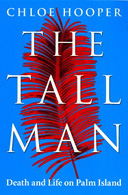 |
Reviews of The Tall Man: Death and Life on Palm Island Chloe Hooper Penguin 2008 |
[This book won the following non-fiction awards: NSW Premier's Literary Award, Australian Book Industry Award, Indie Award, Davitt Award, Ned Kelly Award, John Button Prize, Victorian Premier's Literary Award, and Queensland Premier's Literary Award.]
From the publisher's page
The Tall Man is the story of Palm Island, the tropical paradise where one morning Cameron Doomadgee swore at a policeman and forty minutes later lay dead in a watch-house cell. It is the story of that policeman, the tall, enigmatic Christopher Hurley who chose to work in some of the toughest and wildest places in Australia, and of the struggle to bring him to trial. Above all, it is a story in luminous detail of two worlds clashing - and a haunting moral puzzle that no reader will forget.Note
This book originally started as an essay published in the March 2006 edition of "The Monthly". This essay won a Walkley Award in 2006.
Reviews
Jennifer Moran in "The Sydney Morning Herald": "The Tall Man explores many themes -- the uneasy relationship between Aboriginal and non-Aboriginal Australians, the legacy of our cruel history, the poverty and problems that beset many remote Aboriginal communities, the unequal application of justice -- but at its heart is a compelling human story in which hasty passion and terrible chance propelled one man to defend his character and his profession and the other to a painful, untimely death...Hooper has gathered material from many oral and written sources. An index would have been useful and her notes and attribution could have been less casual. Still, this carping should not detract from what she has accomplished -- a thoughtful, perceptive examination of an important Australian tragedy."
Alison McCullough in "The New York Times": "Hooper followed the case and its main characters for two and a half years, and she does their complexity a remarkable justice. She became involved a few months after Doomadgee's death, when a lawyer representing the island's Aboriginal community said he needed a writer. Hooper's first book, A Child's Book of True Crime, was a novel -- arguably a curious grounding for a work like this one. Or perhaps it set the stage perfectly, with its clever and penetrating account of a gruesome murder. Yet Hooper surely could not have foreseen the tempest into which she was stepping with the Doomadgee case."
Sophia Romano on ABC Online: "In taking up the task of capturing the death of Cameron Doomadgee and the events which followed Chloe Hooper gives dignity to all the victims, both Indigenous and police, without losing sight of the central issue. Pain leads to pain. Violence to violence. The rest remains to be seen...There are so many good elements to this book it must be read by all Australians, Black and White."
Short Notices
Susan Whelan on Suite101: "Chloe Hooper brings a voice of reason and reflection to this complex situation. Both her personal observations and detailed research are presented in a way that stirs a desire within the reader to follow her search for truth and justice through to its eventual conclusion."
Joe Case on the "Readings" weblog: "From the first pages, it's clear that you're in the hands of an extraordinary writer, one who spins out perfectly observed sentences and intricate observations, in a manner eerily reminiscent of Helen Garner (who calls this book 'enthralling')."
Fleur Taylor on the "Socialist Alternative" website: "Hooper has said that she didn't want to write a book about issues; she wanted it to be about people. But no person exists outside of the society that creates them. Hooper's investigation of how Senior Sergeant Chris Hurley killed Cameron Doomadgee in a police station in 2004 lays bare the workings of Australian racism in a way that will leave you breathless with rage and sorrow."
Interviews
Chloe Hooper in conversation with Sally Warhaft on "The Monthly" website.
Benjamin Law in "The Courier-Mail".
Extracts
The Prologue in "The New York Times".
An extract in "The Age".
Other
The book has its own website.
Hooper published a follow-up essay, "In search of Palm Island's true victims", on the Crikey website in October 2008.
